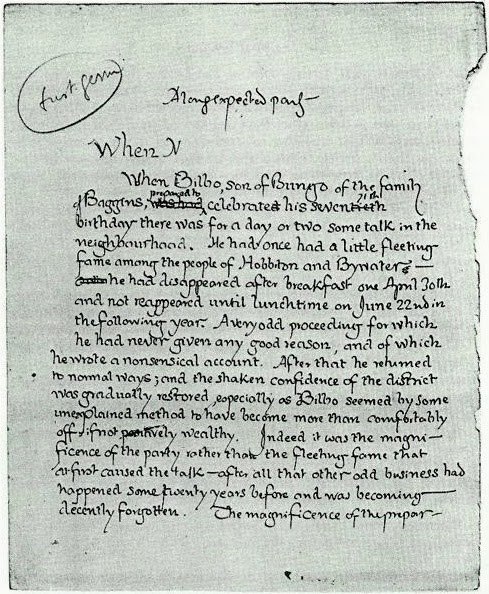It was almost certainly going to say "When Mr. Bilbo Baggins...", but Tolkien apparently changed his mind halfway through the first letter of "Mr".
In The History of Middle-earth, Volume VI, The Return of the Shadow, Christopher Tolkien describes his father's first draft of the first chapter of what later became The Fellowship of the Ring as follows:
When he [i.e., J.R.R. Tolkien] first put pen to paper he wrote in large letters 'When M', but he stopped before completing the final stroke of the M and wrote instead 'When Bilbo...' The text begins in a handsome script, but the writing becomes progressively faster and deteriorates at the end into a rapid scrawl not at all parts legible. The text that follows represents the original form as I judge it to have been, granting that what is "original" and what is not cannot be perfectly distinguished.
- The History of Middle-earth, Volume VI, The Return of the Shadow, p. 11
So the first draft was initially going to begin with "When M----", but this idea was immediately dropped in favor of:
When Bilbo, son of Bungo of the family of Baggins, had celebrated prepared to celebrate his seventieth seventy-first birthday there was for a day or two some talk in the neighborhood.
The second draft begins:
When Bilbo, son of Bungo, of the respectable family of Baggins prepared to celebrate his seventy-first birthday there was some little talk in the neighborhood, and people polished up their memories.
- ibid, p. 19
A later draft, which doesn't seem to have a number like the previous drafts, begins:
When Mr. Bilbo Baggins of Bag End, Under-hill, announced that he would shortly be celebrating his eleventy-first birthday with a party of special magnificence, there was much talk and excitement in Hobbiton.
- ibid, The Second Phase, Chapter XIV, Return to Hobbiton
The final, published version of the text reads:
When Mr. Bilbo Baggins of Bag End announced that he would be celebrating his eleventy-first birthday with a party of special magnificence, there was much talk and excitement in Hobbiton.
- The Lord of the Rings, The Fellowship of the Ring, Book I, Chapter 1: A Long-Expected Party, p. 21
It is clear that Tolkien's original intent was to begin the story by mentioning Bilbo1 and his impending birthday party. He began to write "When Mr. Bilbo Baggins...", but for whatever reason, changed his mind and dropped the "Mr.", opting instead for "When Bilbo". I haven't read much more than this part of The Return of the Shadow yet, but skimming through the rest of the book, it appears that the version of the first chapter that was eventually published in the finished book was at least the fifth or sixth revision.
1 The third draft deviated from the prior pattern. Instead of beginning with "When [Mr.] Bilbo Baggins and his stupid birthday blah blah blah", it began by mentioning Bilbo's son:
When Bingo, son of Bilbo, of the well-known Baggins family, prepared to celebrate his fifty-fifth seventy-second birthday there was some talk in the neighborhood, and people polished up their memories.
- The History of Middle-earth, Volume VI, The Return of the Shadow, Chapter I: A Long-Expected Party, p. 28
This change seems to reflect Tolkien's wavering on the question of whom the story would be about - at first, according to Christopher Tolkien, the part we know as Frodo's was going to be filled by Bilbo himself. At some point as he was writing, Tolkien scrapped this idea and decided to make Bilbo's son Bingo the main character. This idea also shows up (albeit in a further revised form) in the fourth draft:
In the first sentence of the chapter, 'Bingo, son of Bilbo' was altered to 'Bingo Bolger-Baggins'; and in the third sentence 'Bingo's father' was altered to 'Bingo's uncle (and guardian), Bilbo Baggins'.
- ibid, p. 36
This version of the chapter is the first to describe the relationship between Bilbo and the main character of the story in the way with which we are familiar: although the main character's name is still unfamiliar to us, he is now Bilbo's nephew and ward, not his son. This nephew, Bingo, would not become "Frodo" until a much later stage in the writing process.

